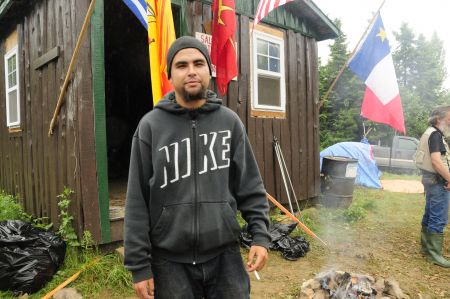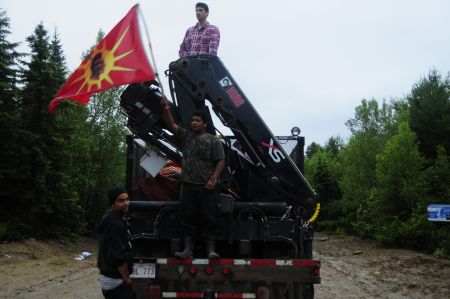His birth date, 17 March, 1989, is tattooed across his neck in Roman numerals. A grim reaper draped across his right arm represents all the death he’s witnessed in his life. A nude drawn by a friend on his left arm represents the beauty he sees in women.
Thomas Nelson Nash says he’s found his purpose in the anti-shale gas protests in Kent County.
Nash, a Maliseet native from Fredericton, New Brunswick, acquired his status from his grandmother’s side, who grew up on St Mary’s Reserve. His great-great grandfather, Louis Paul, was a code-talker in World War Two.
Maliseet, a Mi’kmaq name for “slow talker,” refers to what they call themselves as Wolastoqiyik or “people of the beautiful (St. John) river.”
Nash joined the protests on the 14th of June, when the first arrests happened at sunrise as he and others marched toward the seismic testing trucks on Highway 126. He responded to a Facebook call from a fellow Idle No More activist saying numbers were needed in Kent County, where Texas-based Southwestern Energy (SWN) has been exploring for shale gas deposits. He and the others arrested that day were released on the condition they stayed one kilometer away from testing vehicles.
The protest zone was informally divided into colour zones: “red” was for a high chance of being arrested. Nash started dancing a little past the yellow line when a line of RCMP started walking down the road toward him. He, Angie Beek and Ron Tremblay were all on the front lines when they were arrested. Nash pulled out half a cigarette for prayer offering when an officer barked out an order.
“Get off the road or I arrest you.”
Nash put down his cigarette. Two cops pushed him to the ground. They asked for identification and patted him down. Nash looked around him and saw Angie singing the Mother Earth song at the crossroads. He was thrown into the back of a police van which took him to Richibucto station, where he was detained for about an hour and released around 11:30 am.
The next day he stayed up all night with Segawhat, the original firekeeper at the Sacred Fire encampment off Highway 116 in Elsipogtog Reserve, formerly known as Big Cove. When Segawhat went to bed, Nash took over duty and as firekeeper and has fulfilled this role at the camp ever since.
This means he wakes up at dawn for six hour shifts, 6am-12 noon. He takes part in sunrise ceremony when everyone does their morning prayers, keeping the smudge bowl ready to burn sage if people want blessing, the drum ready if people want to sing. He steps in if one of the other boys needs a break to make sure the fire never dies out.
“Since I’m the oldest one, I get to play big brother for once in my life,” he says.
Angie and Ron — two of twelve who were arrested with him on his first day protesting — constitute the mother and father figures he never had as a child.
Nash was raised by his grandfather since he was a year old and his mother wound up in jail. He’d visit his family in Central Blissville on weekends but they were always partying, always fighting.
When his grandfather passed on November 1, 1999, Nash went to live with his uncle. His uncle hit him ten times on each hand after catching him eating chips one day after school in the sixth grade. “It was just hell,” he remembers. “I was always punished, beat with a belt.”
Nash joined his school football team in the eighth grade and learned to play guitar. High school was a heady mix of Black Sabbath and local metal shows, parties and marijuana. He flunked out of university after his first year, spending his Bingo Hall royalty cheques from the reserve on liquor and weed. It was a way, in part, to escape his uncle’s control.
At a New Year’s Eve party in 2010, Nash was imbibing on the usual suspects when something took a hold of him. He was Jesus Christ; he could understand all languages; he could speak to animals. He spent the next few weeks in a hospital psych ward on antipsychotics and anti-anxiety medications Risperidone and Clonazepam.
Over the next couple years, Nash battled with depression, his uncle’s increasing violence toward him and his brothers, and several relapses into drugs and alcohol.
But it was also a time of revelation. He found his father’s obituary online: he also had psychotic tendencies which eventually led him to suicide. But Nash also learned that his father painted, made pottery, and played in light rock and country bands throughout the 1980s. “That’s where I got all my musical talent,” he ruminates.
Nash was drinking with his brothers when he received a text message from an ex saying he had a son named Kayden. “In pictures he has the same curly blond hair, the same brown eyes as me. But I don’t want to get too attached in case he isn’t mine.” He has split the cost of a DNA test and birth certificate with his mother.
He has stayed clean of drugs and alcohol since he joined the resistance in Elsipogtog.
Two weeks ago, Ron gave him a drum which he has used in sunrise and sunset ceremony and during the protest of Line 5 in Rogersville. Song, prayer, and spirituality has served him better than government programs like AA or counselling, he says, though he’s been through both.
“The city is full of poison, but here, I’m away from all that.”
When the camp closes he wants to move up to Kent County and visit Elsipogtog to gain the tools to lead a rural life. “I want lots of land. I want a homestead. I want woodland for medicines, walking trails, land for farming and raising cattle. Waterways for hunting and fishing. I want at least three more kids and rottweilers.”
The day after the Mi’kmaq warriors returned and Nash joined an eight-hour standoff with RCMP — which involved his girlfriend strapping herself to a 20-tonne testing truck — he shaved his head and joined the Warrior Society.
During the stand-off, Nash approached me and said: “I’ve been beaten many times in my life. The cops don’t scare me now.” He returned to the truck with a determined look on his face. Just as an elder had said at the Sacred Fire camp site, “even if we don’t stop SWN, we have succeeded at creating some strong young men here.”




